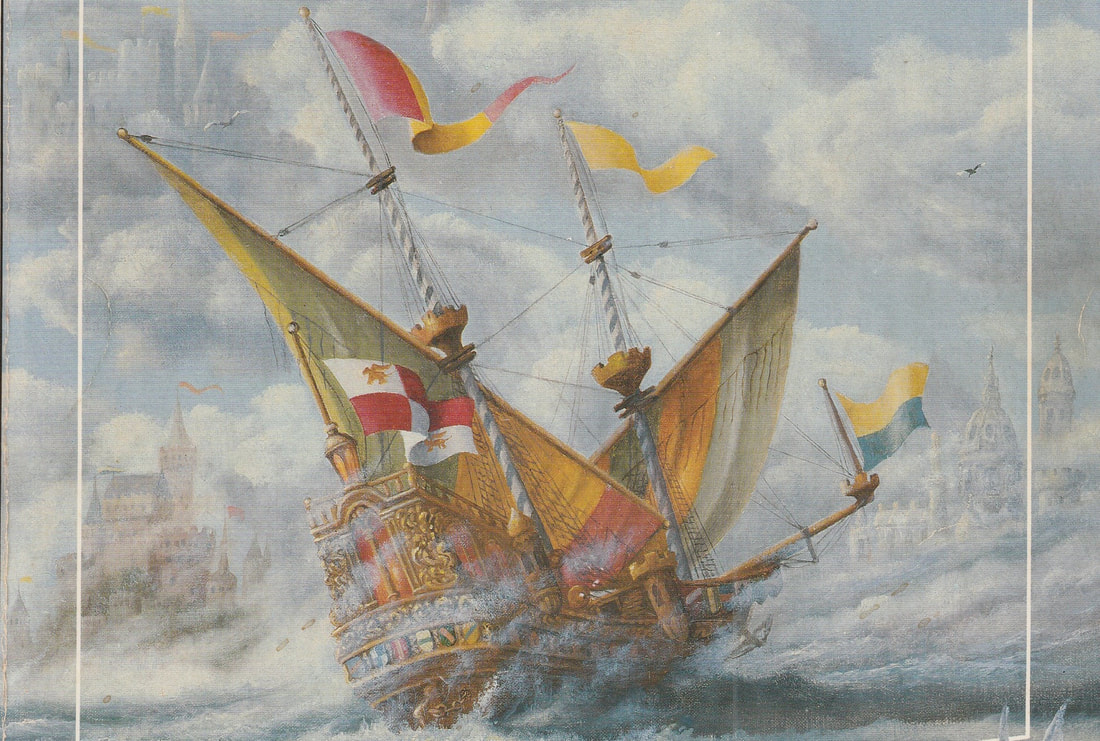|
Art by Raymond Bayless from Chaosium's cover of the Complete Dreamlands 4th edition, 1997. This being a short exploration of the Waking World individual and his falling into the lure of Dreamland. The focus of the story is escape. The main character is set up with despair at his current life:
His money and lands were gone, and he did not care for the ways of people about him, but preferred to dream and write of his dreams. Without any purpose to ground him in the Waking World by his lose of his identity – money and land, he becomes unmoored and needs an escape. This is found in dreams. It is clear that in the beginning these are ordinary dreams. But then… The more he withdrew from the world about him, the more wonderful became his dreams; and it would have been quite futile to try to describe them on paper. Kuranes was not modern, and did not think like others who wrote. Whilst they strove to strip from life its embroidered robes of myth, and to shew in naked ugliness the foul thing that is reality, Kuranes sought for beauty alone. When truth and experience failed to reveal it, he sought it in fancy and illusion, and found it on his very doorstep, amid the nebulous memories of childhood tales and dreams. The theme of childhood tales, myths and legends, shows up here as it does in the Dream Quest (1926/1927). Dreamland is a way to access his preferred escape into childhood and leave behind adult failures. There are not many persons who know what wonders are opened to them in the stories and visions of their youth; for when as children we listen and dream, we think but half-formed thoughts, and when as men we try to remember, we are dulled and prosaic with the poison of life. The allure of escape is strong. He dared not disobey the summons for fear it might prove an illusion like the urges and aspirations of waking life, which do not lead to any goal. He recalled a childhood event of seeming successful escape but where he was by adult’s supposedly rescued back into the gray ordinary Waking World. where his spirit had dwelt all the eternity of an hour one summer afternoon very long ago, when he had slipt away from his nurse and let the warm sea-breeze lull him to sleep as he watched the clouds from the cliff near the village. He had protested then, when they had found him, waked him, and carried him home, for just as he was aroused he had been about to sail in a golden galley for those alluring regions where the sea meets the sky. He despaired of his failed life and the misery that he found himself in and thus the allure of escape was extreme and powerful. In time he grew so impatient of the bleak intervals of day that he began buying drugs in order to increase his periods of sleep. Hasheesh helped a great deal, and once sent him to a part of space where form does not exist, but where glowing gases study the secrets of existence. And a violet-coloured gas told him that this part of space was outside what he had called infinity. The gas had not heard of planets and organisms before, but identified Kuranes merely as one from the infinity where matter, energy, and gravitation exist. Kuranes was now very anxious to return to minaret-studded Celephaïs, and increased his doses of drugs; but eventually he had no more money left, and could buy no drugs. Then one summer day he was turned out of his garret, and wandered aimlessly through the streets, drifting over a bridge to a place where the houses grew thinner and thinner. And it was there that fulfilment came, and he met the cortege of knights come from Celephaïs to bear him thither forever. He used drugs to push that escape and to facilitate it. Then his failed life engulfed him and he could not even afford the drugs that was his only means to escape into the world of dreams and Dreamland. Now here Lovecraft creates a ‘happily-ever-after’ fantasy of escape succeeding. Allowing his character to jump from death into eternity in his projection of his dreams. This happy allure is the ultimate escape and presumably something that Lovecraft himself desires. To live a life not as it is but as it once was. Lovecraft creates the illusion of life beyond death. Why not, does not Christianity offer heaven as the eternal resting place of a soul in some never-never-land of bliss? Why not allow death to be transcended by the ultimate escape that it is. Do not all childhood stories end in: And they lived happily ever after?
0 Comments
|
Gary Jaron's musings.
In my High School Art Department someone had made an ornate sign on hung it on the wall that read: 'Ignore this sign completely.' A paradox couched in sarcasm and irony. This blog is for random musings on anything and everything that comes into my head. Archives
June 2024
Categories |

 RSS Feed
RSS Feed